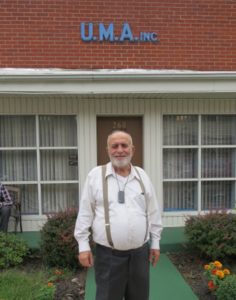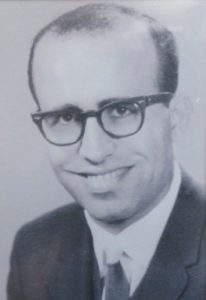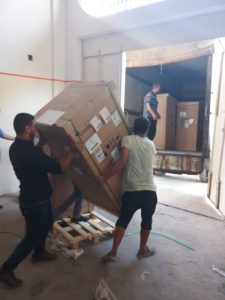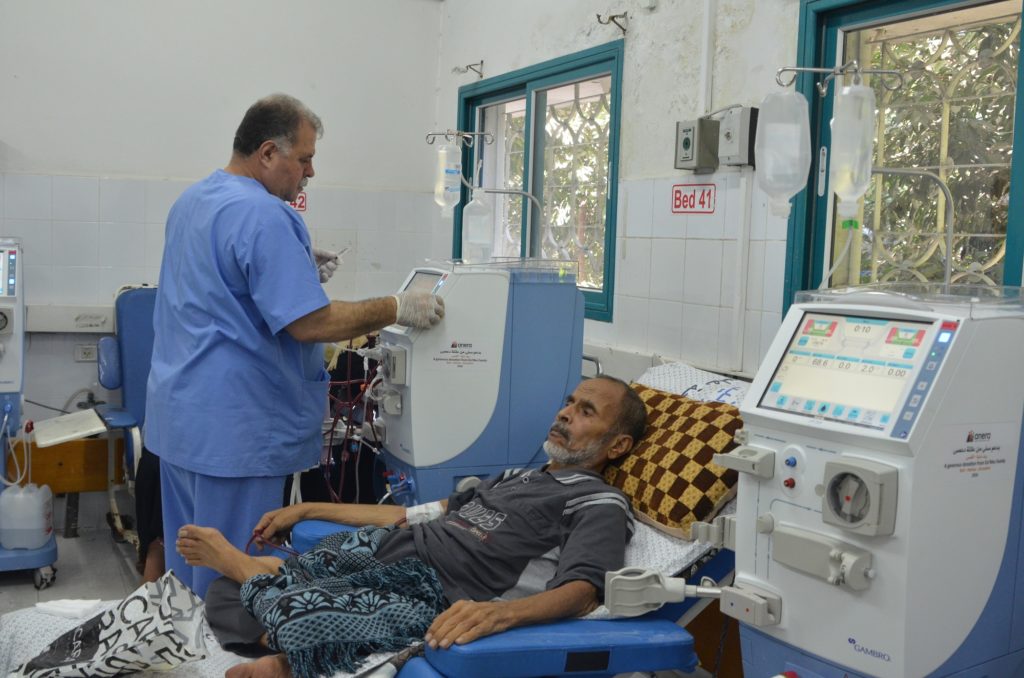Honoring my parents by giving back
Posted in: peopleofanera
Born in a Jerusalem hospital in 1935, the circumstances were not without drama. The region was then under British rule and it was a time of great upheaval and continuous revolt. My mother went into labor with me in the midst of an outbreak of fighting between Palestinians on one side, and British and Haganah forces on the other.
Due to the fighting, there was no ambulance available to take her to the hospital. So instead, my mother rode to the hospital in a bus waving a white flag. The route to the hospital required us to pass through the contested area, right past a wall dividing the combatants. After announcing the bus was carrying a woman in labor, firing between the two sides actually halted to permit passage of the bus down the road to the hospital.


Mr. Awad Da’Mes at his offices in Virginia
I grew up in Beit Hanina, a village a few kilometers outside central Jerusalem. My father was a prosperous farmer who owned many plots of land.
Despite the simmering conflict, on a personal level Arabs and Jews generally had good relations in those days. My father’s best friend was an observant Jew. This friend would often take me to preschool on a donkey. He was actually the one who taught me the first chapter of the Quran, during those donkey rides.
My first years of secondary school were spent at a Jerusalem high school. In order to learn English, I left to spend the last year of high school in Ramallah, at the Quaker-founded Friends School, where most of the teachers were American.
In 1957, I came to the U.S. for college. My brief stint at Roosevelt University in Chicago lasted only one semester. I ended up in Connecticut and met with the dean of Fairfield University, a Catholic school. The dean welcomed me in my native tongue. He was an American but had lived in Jerusalem for 15 years and spoke fluent Arabic. He quickly discouraged my plans to study accounting and economics. He told me, “Jerusalem needs engineers!”
And so, with a reference in hand from the dean, I enrolled at the Bridgeport Engineering Institute (since incorporated into Fairfield University). I was the only foreign student in the whole school.
Once I obtained my B.S. in 1965, I returned home to Beit Hanina to get engaged. I didn’t stay home long – I soon went back to the U.S. to enter a master’s program.


Mr. Awad Da’Mes in the 1970s
I quickly found work as an engineer in Stratford, CT. I was still new at the job when I heard that Jerusalem was captured by Israeli forces. I promptly walked off my job to do something about it! I went to the UN in New York, looking to organize a response to the war. Before my plans advanced very far, the war ended.
That same summer, I crossed the Jordan River – illegally and on foot, as it was the only way I could get in – to marry my fiance, Najla. Because of the war we did not have a ceremony. We crossed back over Allenby. We were only able to leave under condition that we relinquish our Palestinian citizenship. We spent six months in Amman, where I tried unsuccessfully to find work. So Najla and I set off for the U.S.
I began working at Grumman Aerospace in New Haven, CT. I was one of the engineers involved in a proposal submitted to NASA for their lunar landing module. I worked on the fuel system design. We lost the bid, but some of our engineering work was used in the final project. Later, I worked on the F-14 fighter jet fuel system, and made a major upgrade to the design used in previous jet systems.
The aerospace industry declined in the ‘70s so I and some colleagues decided to strike out on our own to form a new business. We eventually bought UMA, Inc., manufacturing medical instruments and aircraft gauges and other equipment. The business did well.
My family also grew. Najla and I had three sons, and a daughter. In 1978, we moved from New York to Harrisonburg, VA. Najla earned a degree in finance at the local university. My wife and later my daughter both joined the company to help run it.
Although my career and family were thriving, I never forgot my homeland. When I went back to Beit Hanina last year, I tried to visit my father’s lands. Many of the plots were totally inaccessible, laying behind the wall Israel has continually built since 2004. Other plots of my father’s land were split by the wall, or had been seized by Israel.
I am still very fond of these lands, and the acres of figs and grapes they had when I was a child. I had hoped to build a house on some of the remaining land where my wife and I could retire. But the exorbitant building licensing fees Israel asks of Palestinians made it impossible.


Delivery of the dialysis machines to the renal dialysis department in al-Shifa hospital.
Although my father was not well-educated, he taught me to value education. In honor of his memory, a few years ago I contributed to a program at Birzeit University to standardize sign-language taught to deaf children across Palestine.
After the 2014 war in Gaza, I got connected to Anera and began donating. I had contributed to an educational program in memory of my father, so now I wanted to find a way to honor my mother, Haja Aysha Mohammed Mahmoud Da’Mes.
My mother was from Jordan originally but had lived in Beit Hanina since marrying my father. After he passed in 1976, I brought her to live with me and my siblings in the New York area. She had chronic kidney problems and spent years undergoing dialysis treatments.
Although my career was going well, it often prevented me from spending as much time with my mother as I would have liked. I remember once visiting her toward the end of her life, while she was undergoing dialysis treatment in a dingy, poorly-lit Brooklyn hospital. “You brought me to this place,” she had told me reproachfully. The memory still brings me pain. I can’t forget that she wasn’t happy in that place. We buried her in Palestine with my father.
Donating kidney dialysis machines to al-Shifa Hospital in Gaza is my gesture to honor my mother’s memory. In Islam, a donation that provides ongoing benefits is called sadaqa jariya, and its spiritual blessing is imparted to the person remembered. Given that my own mother relied upon dialysis in her final years, it felt appropriate to remember her by ensuring others in need will have access to high-quality kidney treatment for many years to come. I am gratified that the ten dialysis units fill a critical gap in healthcare capacity in Gaza. The donation is my way of fulfilling my commitment to my mother and honoring her in the hereafter.


New dialysis machines in use
OUR BLOG
Related
In this log, Anera provides updates on unfolding war in Palestine and our response. Please stay tuned here for the latest information. To subscribe for weekly updates via SMS on our response in Gaza, text GAZA to 1-866-549-0055. Questions? See…
I’m from Bethlehem, Palestine. This is my home. My family has been rooted here for generations. I have spent my entire life in this city—47 years born and raised. I’ve been with Anera since 1999, marking 25 years as of…
Standing in the heart of Tyre, a city once full of life and history, I felt the weight of the devastation here, pressing down like the rubble that now defines its streets. As my team and I walked through the…
